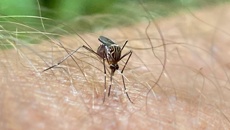
Experts say it's not unusual that the daughter in the family at the centre of the latest Covid-19 flare-up reported symptoms before her mother, who is thought to have caught the virus first.
Director-general of health Dr Ashley Bloomfield pointed to that curious fact today, when explaining why officials were keeping an open mind about the source of the infection.
"The important thing about a source is keeping an open mind and not to jump to conclusions, just because the mother works around the airport precinct is not to say 'oh that's where it's come from'," he said.
"One of the interesting things here is that the daughter reported onset of symptoms before the mother. So we have to be open-minded that she could be the first case, and could have got it somewhere else. And that's what we're trying to track down."
Still, the mother - who works at airline food and laundry provider LSG Sky Chefs - was considered the most likely of the three family members to have contracted the virus first.
Otago University epidemiologist Professor Michael Baker said it might sound "ominous" that the daughter showed symptoms first, as that suggested it was she who caught the virus - and from somewhere within the community.
But he explained that Covid-19 symptoms - and how and when they emerged - were known to vary from person to person.
The incubation period of the SARS-CoV-2 virus - that's the time between exposure to the virus and symptom onset - is on average five to six days, but could sometimes be as long as 14 days.
"It's hugely variable, and has a big range, but is clustered around five to six days," Baker said.
"Someone could be infected and then their peak infectivity develops before they develop symptoms themselves - possibly two and a half days after," he said.
"In other cases, people might have symptoms that weren't enough for them to take seriously."
Otago University and ESR virologist Dr Jemma Geoghegan also added there was much variability between cases within the incubation window.
"Given these two people - the mother and daughter - have very close contact on a daily basis, it would be very hard to pinpoint who got infected first, without knowing that index case [the virus was contracted from]," she said.
"It could have just been a matter of hours between one person being infected, and then them infecting the other person as well."
Like Bloomfield, Geoghegan said all possibilities still needed to be considered.
Take your Radio, Podcasts and Music with you









